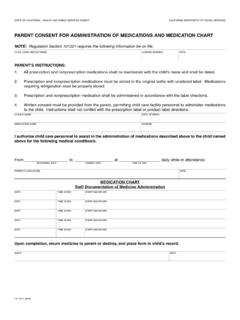Transcription of O ARTICLES Child consent in South African law ...
1 ORIGINAL ARTICLES247 April 2010, Vol. 100, No. 4 SAMJ248 Children under the age of 18 are legal minors and, accordingly, have limited legal capacity to act independently without the assistance of an However, South African legislators recognised that children have evolving capacity, and consequently passed laws that permit children to make certain decisions independently. Some of these laws are in operation, while other provisions will be implemented in the treatmentCurrently, children can consent independently to medical treatment from the age of 14; those below 14 require consent from a parent, legal guardian or other designated In the future, children will be able to consent to medical treatment from the age of 12, if they have sufficient maturity.
2 3 HIV testingCurrently, children can consent independently to an HIV test from the age of 12, when it is in their best interests, and below the age of 12 if they demonstrate sufficient maturity ; they must be able to understand the benefits, risks and social implications of an HIV ,5 This norm is not likely to change in the immediate to contraceptivesCurrently, children can consent to contraceptives and contraceptive advice from the age of This norm is not likely to change in the immediate of pregnancyCurrently, girls can consent to a termination of pregnancy at any This norm is not likely to change in the immediate , children cannot consent independently to a medical operation until they are When s129(3) of the Children s Act comes into operation, a Child over the age of 12 may consent to surgical operations if he/she (i)
3 Has sufficient maturity and has the mental capacity to understand the benefits, risks, social and other implications of the surgical operation ; and (ii) is assisted by a parent or circumcisionCurrently, boys are able to consent independently to circumcision only when they are 18 as the procedure is classified as an operation. In the future, when s12(8) of the Children s Act comes into operation, boys below age 16 can only be circumcised for religious or medical reasons on the recommendation of a medical practitioner whereas those above 16 may undergo circumcision for any Boys over 16 must receive counselling prior to the circumcision, and they have the right to refuse researchCurrently, there is no clear legal statute specifying when children can independently consent to research; however, there are ethical norms.
4 For clinical trials, these norms require parental consent and Child For other forms of health research, these norms generally require consent from a parent; however, they do allow independent consent from older adolescents for low-risk In the future, when s71 of the National Health Act is implemented, parental/legal guardian consent will be mandatory for all health research; in addition, children will be required to consent alongside their parent if they have sufficient understanding .5 There is no mention in this Act of the need to obtain assent from a Child who does not have the required understanding to consent to the research. However, this would be considered good practice, considering that the Children s Act specifies that children have a right to participate in an appropriate way in matters that affect , it is an offence to have sex below the age of 16, even when sex is This means that if one or both of the persons engaged in consensual sex are below the age of 16, they are committing a criminal offence.
5 This norm is not likely to change in the immediate consent in South African law: Implications for researchers, service providers and policy-makersAnn Strode, Catherine Slack, Zaynab EssackFaculty of Law and HIV/AIDS Vaccines Ethics Group, University of KwaZulu- Natal, PietermaritzburgAnn Strode, LLMHIV/AIDS Vaccines Ethics Group, University of KwaZulu-NatalCatherine Slack, MA Clin PsychZaynab Essack, MSocSci Res PsychCorresponding author: A Strode under 18 are legal minors who, in South African law, are not fully capable of acting independently without assistance from parents/legal guardians. However, in recognition of the evolving capacity of children, there are exceptional circumstances where the law has granted minors the capacity to act independently.
6 We describe legal norms for Child consent to health-related interventions in South Africa, and argue that the South African Parliament has taken an inconsistent approach to: the capacity of children to consent ; the persons able to consent when children do not have capacity; and restrictions on the autonomy of children or their proxies to consent . In addition, the rationale for the differing age limitations, capacity requirements and public policy restrictions has not been specified. These inconsistencies make it difficult for stakeholders interacting with children to ensure that they act Afr Med J 2010; 100: April 2010, Vol. 100, No. 4 SAMJORIGINAL ARTICLESA pril 2010, Vol. 100, No. 4 SAMJ248 DiscussionThe range of consent norms that have been applied across a spectrum of health-related interventions indicate an inconsistent approach to children s emerging autonomy:1.
7 For some procedures, children are given the capacity to consent on reaching a specified age; for other procedures, they must reach the specified age and demonstrate capacity requirements; and yet for other related procedures, there are neither age nor capacity requirements (Table I). For example, according to the future framework, a Child can consent to an HIV test and access to contraceptives on reaching age 12 alone; however, for medical treatment, they must be 12 and demonstrate that they have sufficient maturity . Since all these interventions are health-related, it seems inconsistent not to treat them alike and not have, for example, a maturity criterion for further problem with the inconsistent approach to capacity is that, concerning research (where in the future children will not be able to consent without assistance), a Child s emerging autonomy is not sufficiently recognised.
8 In the future framework, the capacity requirements for research will be extremely stringent, and children under the age of 18 will never be able to consent independently to any form of health research regardless of the risk level. Thus, consent norms for research participation will not appropriately reflect the reality that research is of varying complexity and risk. For simple and low-risk research (such as asking older adolescents for their views on violence on TV), exceptions to the norm of parental consent may be appropriate, provided that other protections are in place, such as ethical review. This strict requirement is out of keeping with socio-behavioural data indicating that older children can understand many components of This observation suggests that their enrolment in low-risk studies without parental consent may be approvable in some There are different approaches to the adult who is considered competent to provide proxy consent when the Child does not have capacity (Table II).
9 For operations, the Children s Act refers to the need for the assistance of a parent or guardian;8 and for research, proxy consent is limited to a parent or legal guardian, effectively undermining research for and with orphans. For other health interventions, male circumcision and HIV testing, the consent of a range of additional persons including caregivers is Different norms apply as to when the activity may be consented to either by children themselves or a proxy consenter (Table III). In the future, 3 health-related interventions may only be undertaken if public policy criteria are met ( special protections exist). These are HIV testing, male circumcision and research which may only be undertaken if they serve the legitimate purpose described in legislation (Table III).
10 The rationale for limiting HIV testing appears to be a desire to end testing that is used to discriminate against However, the justification for limiting male circumcision is less clear, given the health benefits, including evidence that medically circumcised men are at substantially reduced risk of contracting HIV from an infected female18 and the additional protections in the Act regarding consent , Child participation, best interests and confidentiality. These limitations may serve as a barrier to children accessing such services. The rationale for limiting non-therapeutic research with children to research that has been approved by the Minister of Health is unclear, and results in an overly restrictive framework for non-therapeutic research involving Different procedural obligations are placed on persons obtaining consent during some, but not other, health interventions.






